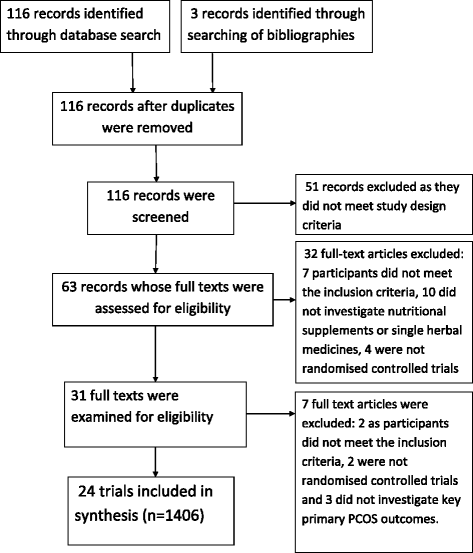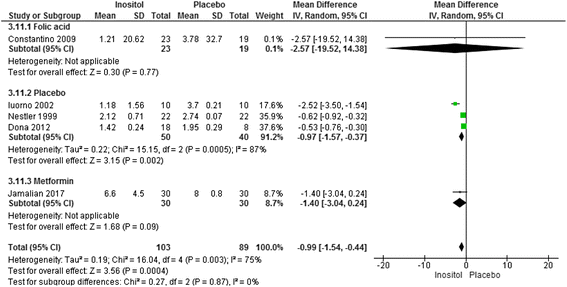Nutritional supplements and herbal medicines for women with polycystic ovary syndrome; a systematic review and meta-analysis
- PMID: 29178904
- PMCID: PMC5702141
- DOI: 10.1186/s12906-017-2011-x
Nutritional supplements and herbal medicines for women with polycystic ovary syndrome; a systematic review and meta-analysis
Abstract
Background: Polycystic ovary syndrome (PCOS) is a common, reproductive endocrinopathy associated with serious short and long term health risks. Many women with PCOS use ingestible complementary medicines. This systematic review examined the effect on menstrual regulation and adverse effects from randomised controlled trials.
Methods: Randomised controlled trials (RCTs) that compared herbal or nutritional supplements to placebo or active controls in women with PCOS were eligible for inclusion. Electronic databases were searched to July 2017. Study selection and assessment of quality were conducted independently by two review authors.
Results: Twenty four studies (1406 women) investigating seven nutritional supplements and four herbal medicines were included. No one study was assessed as having a low risk of bias. Four trials reported on the primary endpoint menstrual regulation. There was no evidence on improved menstrual regularity for calcium plus vitamin D compared to Metformin (RR: 0.66, 95% CI 0.35 to 1.23, p = 0.19), reduced amenorrhoea for Camellia sinensis compared to placebo (RR: 0.17, 95% CI 0.02 to 1.72, p = 0.13) and no difference in the number of menses per month for Cinnamomum sp. against placebo (MD 0.05, 95% CI -0.36 to 1.36, p = 0.26). Adverse effects were investigated in seven studies (164 women). Mild adverse effects were found for Cinnamomum sp. compared to placebo (17 women, RR: 0.36, 95% CI 0.03 to 0.70, p = 0.03). No difference was found for adverse effects between inositol, B complex vitamins, vitamin D, chromium and placebo. Improved reproduction, metabolic hormones and hyperandrogenism was found for inositol and improved cholesterol for omega three fish oils.
Conclusion: There is no high quality evidence to support the effectiveness of nutritional supplements and herbal medicine for women with PCOS and evidence of safety is lacking. High quality trials of nutritional supplements and herbal medicines examining menstrual regulation and adverse effects in women with PCOS are needed.
Keywords: Complementary medicine; Herbal medicine; PCOS; Polycystic ovary syndrome; Supplements; Vitamins.
Conflict of interest statement
Ethics approval and consent to participate
Not applicable.
Consent for publication
Not applicable.
Competing interests
The authors declare that they have no competing interests. SA was a doctoral research student and CAS, JA and AB her supervisory panel.
Publisher’s Note
Springer Nature remains neutral with regard to jurisdictional claims in published maps and institutional affiliations.
Figures
Similar articles
-
Herbal medicine for the management of polycystic ovary syndrome (PCOS) and associated oligo/amenorrhoea and hyperandrogenism; a review of the laboratory evidence for effects with corroborative clinical findings.BMC Complement Altern Med. 2014 Dec 18;14:511. doi: 10.1186/1472-6882-14-511. BMC Complement Altern Med. 2014. PMID: 25524718 Free PMC article. Review.
-
Combined Lifestyle and Herbal Medicine in Overweight Women with Polycystic Ovary Syndrome (PCOS): A Randomized Controlled Trial.Phytother Res. 2017 Sep;31(9):1330-1340. doi: 10.1002/ptr.5858. Epub 2017 Jul 7. Phytother Res. 2017. PMID: 28685911 Free PMC article. Clinical Trial.
-
Folic acid supplementation and malaria susceptibility and severity among people taking antifolate antimalarial drugs in endemic areas.Cochrane Database Syst Rev. 2022 Feb 1;2(2022):CD014217. doi: 10.1002/14651858.CD014217. Cochrane Database Syst Rev. 2022. PMID: 36321557 Free PMC article.
-
Ovarian surgery for symptom relief in women with polycystic ovary syndrome.Cochrane Database Syst Rev. 2017 Nov 10;11(11):CD009526. doi: 10.1002/14651858.CD009526.pub2. Cochrane Database Syst Rev. 2017. PMID: 29125183 Free PMC article. Review.
-
Herbal and dietary therapies for primary and secondary dysmenorrhoea.Cochrane Database Syst Rev. 2001;(3):CD002124. doi: 10.1002/14651858.CD002124. Cochrane Database Syst Rev. 2001. Update in: Cochrane Database Syst Rev. 2016 Mar 22;3:CD002124. doi: 10.1002/14651858.CD002124.pub2. PMID: 11687013 Updated. Review.
Cited by
-
Effects of Soy Isoflavones, Resistant Starch and Antibiotics on Polycystic Ovary Syndrome (PCOS)-Like Features in Letrozole-Treated Rats.Nutrients. 2021 Oct 24;13(11):3759. doi: 10.3390/nu13113759. Nutrients. 2021. PMID: 34836015 Free PMC article.
-
Comparative efficacy of oral insulin sensitizers metformin, thiazolidinediones, inositol, and berberine in improving endocrine and metabolic profiles in women with PCOS: a network meta-analysis.Reprod Health. 2021 Aug 18;18(1):171. doi: 10.1186/s12978-021-01207-7. Reprod Health. 2021. PMID: 34407851 Free PMC article.
-
Antioxidant supplementations ameliorate PCOS complications: a review of RCTs and insights into the underlying mechanisms.J Assist Reprod Genet. 2021 Nov;38(11):2817-2831. doi: 10.1007/s10815-021-02342-7. J Assist Reprod Genet. 2021. PMID: 34689247 Free PMC article. Review.
-
The Possibilities of Using Chromium Salts as an Agent Supporting Treatment of Polycystic Ovary Syndrome.Biol Trace Elem Res. 2019 Dec;192(2):91-97. doi: 10.1007/s12011-019-1654-5. Epub 2019 Feb 4. Biol Trace Elem Res. 2019. PMID: 30715682 Free PMC article. Review.
-
The effects of spinach-derived thylakoid supplementation in combination with calorie restriction on anthropometric parameters and metabolic profiles in obese women with polycystic ovary syndrome: a randomized, double-blind, placebo-controlled clinical trial.Nutr J. 2020 Aug 11;19(1):82. doi: 10.1186/s12937-020-00601-4. Nutr J. 2020. PMID: 32782010 Free PMC article. Clinical Trial.
References
Publication types
MeSH terms
Substances
LinkOut - more resources
Full Text Sources
Other Literature Sources
Medical





